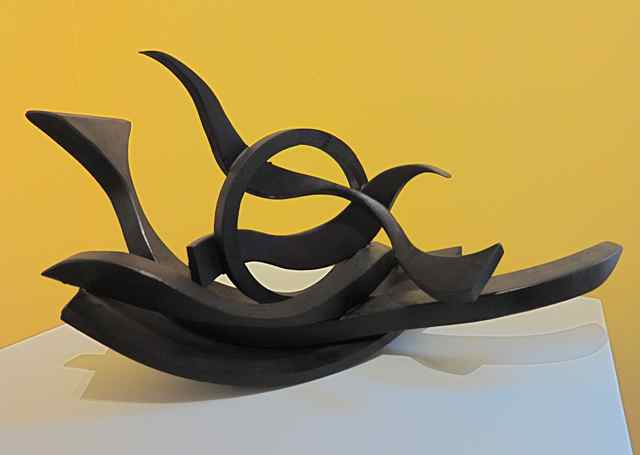Layers of reminders
"#14 Swimmers'' (painted wood sculpture), by MARK LITTLEHALES, at Ann Coleman Gallery, Wilmington, Vt.
I swim most mornings, usually early, It would seem to be boring going back and forth staring at the lane lines below. But repetitive motion in 84-degree water is remarkably soothing. The paradox of exercise is that up to a point, it gives you more energy than it subtracts. And you get into a kind of Zen state. I find the idea of sweating in a gym with a lot of other people (with whom you might have to talk) off-putting. Running is better in that you're outside, with plenty to look at, especially the changing seasons, getting vitamin D from the sun and so on. But the knees go. (I was quite a runner in school and so had a head start in the knee-destruction business.)
It's one of those mornings that reminds us of weather's energy in New England. Yesterday it was warm and tropically humid. This morning snow and ice lay on the ground, and I had to pour windshield-wiper fluid on car windows to speed my exit. Here we are, close to the Gulf Stream but wide open to the winds from Hudson's Bay.
But the buds and blossoms are still swelling, and out of the wind, the sun warms your face. The flowers seem to be thriving this morning; indeed the thin layer of snow may have protected them from being flash-frozen. And the layer of moisture can only help them once it warms up a bit.
But our little rescue dog from San Antonio, whose genes probably include those of Brittany spaniels (he has freckles), wanted his man-made coat back on, as a Manhattan dog would.
Meanwhile, in eastern Ukraine, the Russians continue their invasion, reminding us that dreams that dictators in Europe would no longer cross borders are dead, as if Putin hadn't already given plenty of warning that he would try to reestablish a variant of the Soviet empire that murdered so many people. But then, he has said the end of that empire was a "catastrophe''. And this former KGB counter-espionage officer himself has ensured that political foes' life expectancy is below the average.
Then there's the phenom of countries getting smaller. There's an outside chance that might happen in the United Kingdom. David Speedie, a Scottish native, gave a talk last Thursday at the Providence Committee on Foreign Relations speculating that there's about 45 percent chance that the Scots will vote to split off from the U.K. in a referendum later this year. He also suggested that Scotland would do very well economically by itself, in part because of North Sea oil and gas and f its growing tech sector. ("Silicon Glen'').
That seems unlikely to me, given the wealth creation based in the Home Counties around London. That wealth, I'd guess, would be less available to Scotland if it were independent and most Scots know that. Still, the romanticism of the Scots is feeding the independence movement, as is, of course, resentment about English arrogance, real and perceived. Romanticism is something I'm well aware of from my own crazy (and often drunk) Scottish relatives. They read too much Robert Burns and believed in many conspiracies. One curious one was that the Pope and Stalin were allies.
Still, when you enter Scotland, you pick up their sense of nationhood, which makes the expression "the Scottish nation'' plausible. I remember when there a bit of a sense of that when you'd enter Quebec, back in the '60s. You'd feel more that you were entering Quebec than entering Canada. Of course in those days it was as easy to drive into Quebec as it was to drive from New Hampshire across a Connecticut River bridge into Vermont.
With all the information technology we have these days, with all the ability to transport ourselves via electrons, in many ways we seem more constrained. A good side, I supposed, is that we are harshly denounced for engaging in such bad habits as smoking (which seems to be one of the few pleasures left to the unemployed poor, whatever the vast cost of cigarettes), drinking while driving and so on. But travel has gotten tougher and the very same information technology that permits such time wasters as Facebook threatens to eliminate most jobs, and a lot sooner than many might think.
